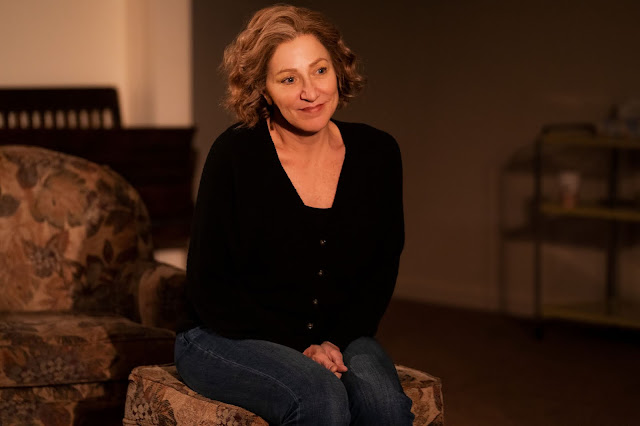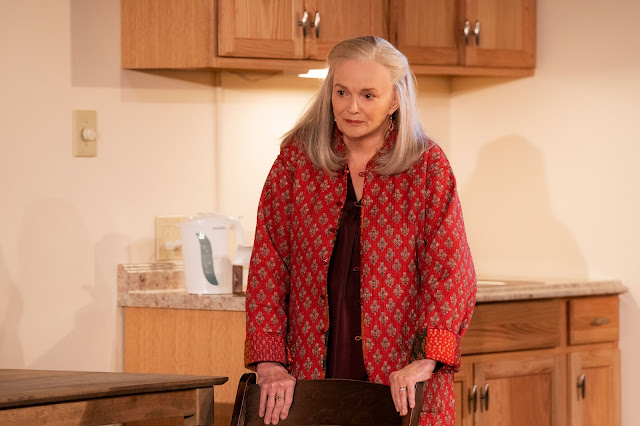 |
| Edie Falco. (Photos: Matthew Murphy) |
 |
| Edie Falco, Marin Ireland. |
 |
| Marin Ireland. |
Those recollections are mostly related to Charlotte (who prefers “Charley”) McBride (designated as “1” in the script), in her mid-fifties. What action there is encapsulates her passage through life, beginning with childhood. Charley’s experiences, of course, are tied to the lives of her mother, Claudette (“2”; Ms. Brown), seen in her seventies, and Charley’s daughter, Tessa (“3”; Ms. Ireland), thirty, as they help Charley navigate issues from her past.
 |
| Edie Falco, Marin Ireland, Blair Brown. |
These memories—bitter, recriminatory, happy, or sad, as the case may be—concern mainly romantic relationships (positive and otherwise) and mother-daughter conflicts, mostly negative. Most are set against the landscape of New York as experienced from the perspective of the fifth-floor walkup on 11th Street in Greenwich Village, where the family long resided.
 |
| Blair Brown, Edie Falco. |
About that walkup. Stephens’s script calls for “a
liminal space” defined more by light and shadows than objects. Lighting
designer Lap Chi Chu has deftly used his skills to realize this goal,
but the setting itself is more literal than liminal. With small, high windows running
across the top of its walls it reads as a basement, but without relevance to anything mentioned in the script, like the apartment the family once owned. Further, its extreme width in
contrast to its low height (like a kabuki stage) serves only to dissipate the
impact of director Lila Neugebauer’s staging on the spacious, relatively bare
expanse.
 |
| Edie Falco, Marin Ireland. |
In this space, the characters drop shared references to familiar places and events, most New York-related, across the past half-century. We hear of the White Horse Tavern, Peter McManus, Washington Square, and the Cherry Lane Playhouse (for some reason called, inaccurately, the theatre on Cherry Lane). Then there are the Beatles, Joni Mitchell, Bruce Springsteen, and Leonard Bernstein, a couple of great moments in New York baseball, the demolition of Penn Station, the Weathermen explosion, the AIDS crisis, the Dakota and John Lennon, the Circle Line, Brighton Beach, Macy’s, Murray’s Bagels, 9/11, the New School, and so on and so forth. Charley’s longest-held job, as a receptionist at the now vanished St. Vincent’s Hospital, recalls an iconic New York landmark.
 |
| Blair Brown, Marin Ireland. |
Stephens seems intent on evoking the drama of even the most ordinary of lives, although the dialogue is rich enough to provide the stars with many histrionic possibilities. I suspect most people will enjoy the performances more than they do the play, which lasts 100 uninterrupted, but not always interesting, minutes. Although there are emotional disruptions, the principal tension comes from the efforts the audience must make to absorb the stream of memories and their significance; otherwise, since these characters drift along across half-a-dozen or so decades, the few dramatic stakes are fleeting.
Each actor portrays both her own principal character, as well as several others (men included), while also now and then serving as a narrator. We meet friends, husbands, lovers, grandfathers, uncles, and the like, some briefly, some at greater length, like the pilot who knocked up Charley on a one-night stand, producing Tessa as a result.
Maybe I was confused but, in one scene, all three women seemed to be sharing lines meant for two people, Claudette even speaking Charley’s words. Whatever’s going on, it’s indicative of the fuzziness created by the writing’s goal of subtle transitions, requiring nuances of attitude as opposed to appearance to distinguish one person from another. It's far easier to distinguish among the dozens of characters invoked by Ruben Santiago-Hudson's solo performance in Lackawanna Blues than it is to figure out this play's dramatis personae.
Late in the play, Charley, on life support, delivers a touching monologue of things she longs for, bits of which made me think of Emily’s farewell to clocks ticking in Our Town. It comes off as something like the eleven o’clock song in a musical, just in time to retrieve Morning Sun from lapsing into total boredom. Ms. Falco, presently icing TV screens with wifely sangfroid as the betrayed Hillary Clinton in “Impeachment,” delivers the goods, as she always does. And the distinguished reputations of both Ms. Brown (looking, sounding, and acting like Lois Smith's doppelganger) and Ms. Ireland are further enhanced by their sterling work.
Whether Morning
Sun drowses or arouses you, I wouldn't be surprised if, as a play for three actresses of different generations, it doesn't have a significant afterlife. If all it does, however, is remind you of its inspiration, the Edward
Hopper painting of the same name, showing a young woman sitting on a bed
staring vacantly out a window into the morning sun, that too is a takeaway of sorts.
Manhattan Theatre Club
City Center Stage 1
131 W. 55th Street, NYC
Through December 19

